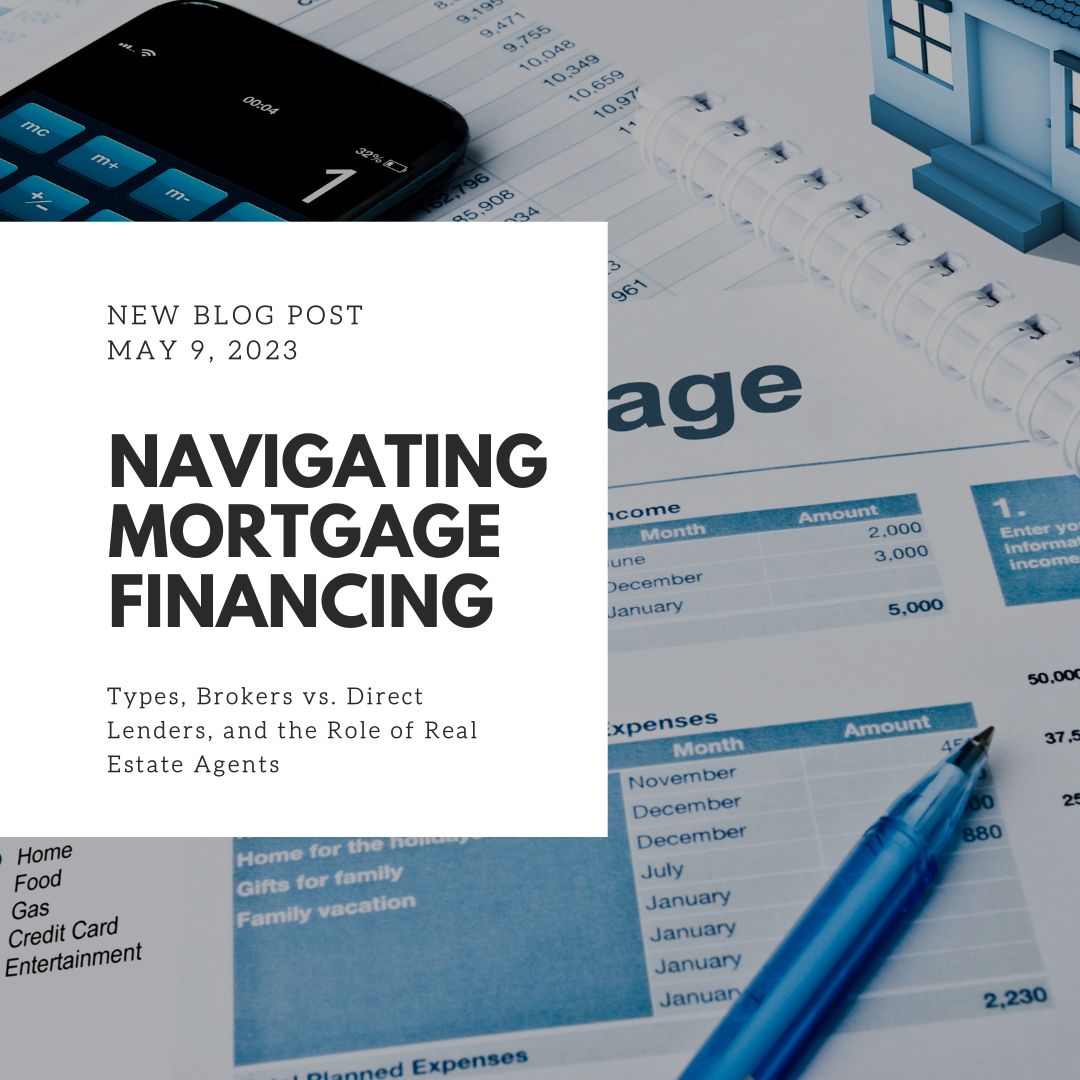Published May 9, 2023
Navigating Mortgage Financing: Types, Brokers vs. Direct Lenders, and the Role of Real Estate Agents

Introduction:
Securing a mortgage is a crucial step in the homebuying process. As a potential homeowner, understanding the different types of mortgage financing, the distinction between brokers and direct lenders, and the advantages of partnering with a real estate agent can greatly assist you in finding the right lender to meet your specific needs. In this blog post, we will delve into these key aspects to help you make informed decisions along your homeownership journey.
Types of Mortgage Financing:
a) Conventional Mortgage: A conventional mortgage is a loan
offered by a private lender without government backing. These loans typically
require a higher credit score and down payment but often offer more favorable
interest rates.
b) FHA Loan: Insured by the Federal Housing Administration (FHA), these loans are designed to assist first-time homebuyers or those with lower credit scores. They often have more lenient qualification criteria and require a smaller down payment.
c) VA Loan: Exclusively available to eligible veterans, active-duty service members, and surviving spouses, VA loans are guaranteed by the U.S. Department of Veterans Affairs. These loans provide favorable terms and require no down payment.
d) USDA Loan: Offered by the U.S. Department of Agriculture, USDA loans are designed to encourage rural homeownership. They provide low to moderate-income borrowers with low-interest loans and may require no down payment.
Broker vs. Direct Lender:
a) Mortgage Broker: A mortgage broker acts as an
intermediary between borrowers and multiple lending institutions. They help
borrowers find the best loan options by assessing their financial situation and
shopping around for competitive rates and terms. Brokers earn a commission from
the lender once a loan is finalized.
b) Direct Lender: Direct lenders are financial institutions,
such as banks or mortgage companies, which provide loans directly to borrowers.
Unlike brokers, direct lenders have the authority to approve and fund loans
themselves. They offer in-house loan products and may have more streamlined
processes.
The Role of Real Estate Agents:
Real estate agents play a crucial role in helping buyers
find the right lender for their needs. Here's how they can assist:
a) Market Knowledge: Experienced agents have an in-depth understanding of the local real estate market and can recommend reputable lenders who have a strong presence and positive track record in the area.
b) Network of Professionals: Real estate agents often have established relationships with lenders, including both brokers and direct lenders. They can leverage these connections to provide you with reliable options tailored to your financial situation.
c) Streamlined Process: Partnering with a real estate agent can help streamline the mortgage process. They can work closely with your lender to ensure a smooth transaction, coordinating documentation, inspections, and other necessary steps.
d) Negotiation Support: Real estate agents possess strong negotiation skills and can help you secure favorable loan terms and interest rates. Their expertise can be invaluable when it comes to navigating the intricacies of mortgage financing.
Conclusion:
Navigating mortgage financing can be complex, but with the
right information and guidance, you can find the perfect fit for your
homeownership goals. By understanding the different types of mortgage
financing, the distinction between brokers and direct lenders, and the benefits
of partnering with a real estate agent, you'll be well-equipped to make
informed decisions and find the right lender to meet your specific needs.
Remember, your real estate agent is your trusted ally throughout this process,
helping you achieve your homeownership dreams with confidence.




